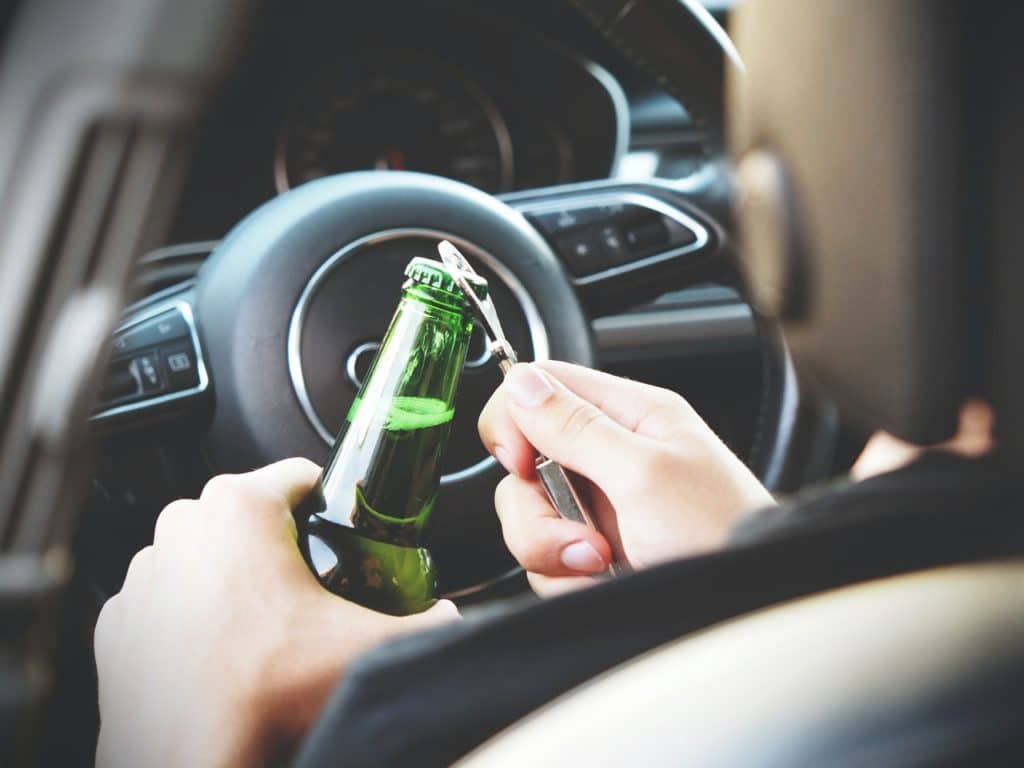Driving under the influence of alcohol can have dangerous consequences. Accidents caused by intoxicated people can result in property damage, physical disabilities, and even death. For this reason, anyone with a DUI should take the situation seriously. They should open themselves up to the possibility that they need treatment for alcohol use disorder (AUD).

Does a DUI Equal an Addiction?
While a DUI does not guarantee that an individual has an alcohol addiction, it can be a strong indicator that they are experiencing or will develop it. People arrested for a DUI often previously drove under the influence many times. A study by the CDC reports that people arrested for DUIs drive under the influence approximately 80 times before being caught. This points toward drinking and driving as a long-term issue.
High recidivism rates also indicate that one DUI can become a pattern. This highlights a more serious problem than just one poor decision. A National Highway Traffic Safety Administration report from 2014 examined recidivism rates across the United States, with 40 states providing information for the study. The weighted mean results showed the seriousness of drunk driving. Some 25% of people arrested for a DUI received a second charge, 29.5% of people convicted of a DUI went on to repeat the actions, and 34% of people with a conviction that received a license suspension for a DUI charge went on to repeat the offense.
The statistics around ignition interlocks also indicate that DUIs connect to alcohol addiction. Ignition interlocks require a driver to use a breathalyzer before starting a vehicle. If they blow above a preset level, the car will not start. They also require retests at random intervals while the vehicle is running. This ensures a person does not drink right after blowing into the interlock. If a person fails their retest, the car will set off an alarm, honk its horn, or flash its bright lights to signal police officers in the area.
A 2015 study in The American Journal of Drug and Alcohol Abuse looks at DUI intervention methods. Judicial systems in 34 states, plus Washington D.C., require the implementation of ignition interlock systems on the car of anybody with a DUI. The goal is to prevent DUI recidivism. While recidivism drops by approximately 60% while the machine is in place, the statistic jumps back up to the previous level after the machines are removed. This shows that a year or two’s drunk driving prevention is not enough to help prevent DUIs. Treatment is needed to decrease recidivism rates among DUI offenders.
Mandatory Substance Abuse Evaluations for DUIs
For people convicted of a DUI, the possibility of jail time creates stress. Luckily, diversion programs exist in many states to allow DUI offenders to receive education and treatment instead. Part of this setup includes mandatory substance abuse evaluations.
Some states perform this prior to a conviction. The results do not impact the outcome of a trial, but they are considered by the judge in the sentencing phase. Other states do not perform an evaluation until after a DUI conviction. This evaluation helps the legal system prevent recidivism. It also gives people with AUDs the opportunity to receive help, rather than simply punishing them.
In either scenario, a licensed medical professional trained in substance abuse intervention will perform interviewing and testing to evaluate the severity of the drinking issue. The person with a DUI may have to participate in a urinalysis or blood test to figure out what substances were recently consumed.
The medical professional often puts together a family history of alcohol use. They discuss how alcohol impacted any relationships. Comorbid mental illnesses may be discussed if they are relevant to the patient’s alcohol consumption. Lastly, the person being interviewed must fill out psychological questionnaires related to their substance consumption. The whole interview will last a couple of hours.
Possible Outcomes of Substance Abuse Evaluations
There are many possible outcomes for court-mandated substance abuse evaluations. An offender may get placed in a treatment program instead of receiving jail time. They can receive AUD medical intervention. They also can receive educational courses led by various organizations. The court may even assign a case manager. The level of treatment required will depend on the findings from the substance abuse evaluation. Possible treatments include:
- Intensive inpatient program
- Partial hospitalization program
- Day program
- Individual therapy
- Group therapy
- Support groups like NA, AA, or SMART Recovery
- Randomized drug testing
All of these possible treatments offer someone with a DUI the opportunity to treat their AUD.
They may be assigned multiple of these treatment modalities depending on the severity of their alcohol addiction. Their substance abuse evaluation gives them the opportunity to prioritize their sobriety in a new way. When a person engages in the outcome, it is important to keep in mind two things:
#1. The substance abuse evaluation helps a person avoid more punitive outcomes in a DUI case. For this reason, the individual in question should be honest about their substance use. It will offer them the chance to change the trajectory of their life.
#2. The treatment recommended by the licensed mental health professional will probably end up as a court mandate. Though the judge has the final decision power, they usually take into account the findings from the evaluation.
The judge, the mental health professional, and the potential case manager will work together to rehabilitate a person after the DUI charge. If a person with an AUD embraces the changes set forth, they will find themselves fulfilled in an alcohol-free life.
DUI Charges Are A Major Red Flag Of Alcohol Abuse
Most people arrested on DUI charges have previously driven under the influence. The rates of recidivism and inefficiency of the ignition interlock system also point toward alcohol abuse in DUI offenders. If you or someone you love received a DUI charge, the courts will usually mandate a substance abuse evaluation.
It’s a great idea to begin a course of treatment at an addiction center or drug rehab after receiving a DUI charge. Not only will this likely make the judge more sympathetic to the charge, it’s also a way to treat a problem that is rapidly spiraling out of control.
Once in recovery, a sober living home is a great place to live while continuing care. Drug and alcohol-free environments, sober homes protect from relapses and potential further conflicts with the law. There’s no better place to live while recovering than a sober living home.
Finding a sober living home isn’t always easy. That’s why we created SoberLivingNearYou.com, the web’s largest directory of sober living homes. With our site, finding a sober living home to recover in has never been easier.
Start searching today with SoberLivingNearYou.com!



